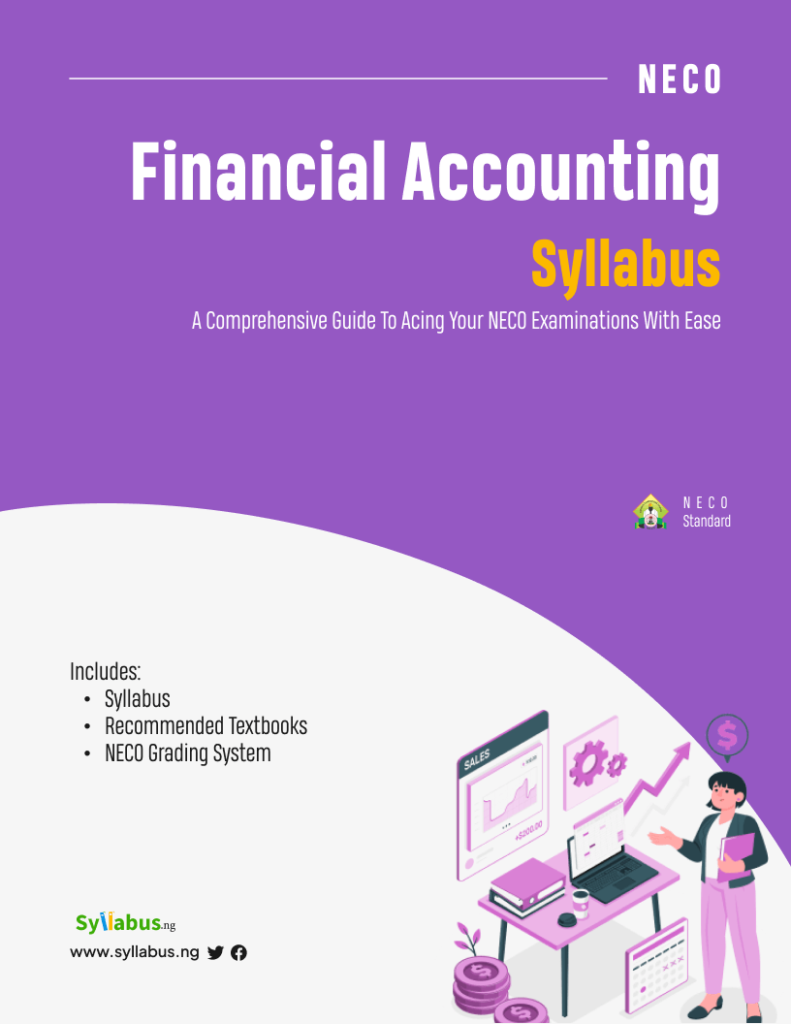NECO Financial Accounting Syllabus
Are you writing Financial Accounting in your NECO O’level exams? Download the recommended Financial Accounting syllabus to excel in your exams.

Home » NECO Syllabus » NECO Financial Accounting SyllabusAbout NECO Financial Accounting Syllabus
This Financial Accounting NECO examination is designed to serve as your guide to understanding what is required of you in your NECO Accounting Examination. Before you sit for your exam, you are expected to understand the complexities of accounting.
The NECO financial accounting exam is more than just an exam, it’s a means to test your foundational knowledge and skills. it will be a stepping stone that will pave the way for your futureendeavorss in the field of accounting.
Marking Guide & Sections
Let’s break down how your performance will be evaluated in the NECO financial accounting exam. you’ve got two papers to answer. Paper 1 and Paper 2.
Paper 1
Paper 1 consists of 50 multiple-choice questions and you have one hour to answer them. You have to make proper use of your speed and precision so as not to run out of time. is all about speed and precision. This section will be testing your overall knowledge of the subject, and each correct answer earns you a mark, so make every mark count.
Paper 2
Paper 2 is where things get a bit more difficult. you’ve got two sections here: Section A and Section B.
Section A
In Section A, you will be dealing with the theory of financial accounting. You will be given five essay questions, but don’t worry, you only need to pick two to answer. Each question is worth 15 marks, so make sure your responses are thorough and on point.
Section B
In Section B, it’s all about putting theory into practice. You will be given another five essay questions, this time focusing on financial accounting practice. But here’s how it goes, you only need to choose three questions to answer. Again, each question carries 15 marks, so choose wisely and showcase your practical skills with confidence
Download NECO Financial Accounting Syllabus

Best candidates excel because they study smart and hard. Know what’s expected of you.
Download the NECO recommended Financial Accounting syllabus.
The NECO Financial Accounting Syllabus
| FINANCIAL ACCOUNTING | |||
| SN | TOPICS | OBJECTIVES | |
| 1 | Introduction to Financial Accounting | 1.1 History, nature and functions of Accounting. 1.2 Users of Accounting information 1.3 Stages in the Accounting process 1.4 Characteristics of Accounting information | |
| 2 | The Accounting Equation and Double Entry Principles | 2.1 Accounting Equation 2.2 Purpose and functions of source documents 2.3 Subsidiary books. 2.4 The ledger: classification of Accounts. 2.5 Cash Book: analytical cash book, including petty cash book. 2.6 Preparation of Trial Balance. 2.7 Bank Reconciliation Statements | |
| 3 | Accounting Concepts | 3.1 Meaning. 3.2 Types. 3.3 Significance. 3.4 Limitations. | |
| 4 | The Final Accounts of a Sole Trader/proprietorship | ||
| 5 | Provisions and Reserves | 5.1 Provision for doubtful debts/Allowance for doubtful debts. 5.2 Provision for discounts. 5.3 Depreciation – concepts, reasons for recording and methods: (i) straight line; (ii) reducing balance; (iii) sum of the years digits; 5.4 Accounting for depreciation. 5.5 Reserves – revenue and capital reserves. | |
| 6 | Manufacturing Accounts | 6.1 Purpose of Manufacturing Accounts. 6.2 Cost classification in Manufacturing Accounts. 6.3 Preparation of final Accounts of Manufacturing concern. | |
| 7 | Control Accounts and Self Balancing Ledgers | 7.1 Meaning and uses of control accounts 7.2 Types: (i) sales ledger control (ii) purchases ledger control 7.3 Preparation of Control Accounts 7.4 Reconciliation of Control Accounts | |
| 8 | Single Entry and Incomplete Records | 8.1 Meaning and limitations 8.2 Computation of profit or loss from opening and closing balance sheets. 8.3 Conversion of single entry to double entry. 8.4 Preparation of final accounts from a set of incomplete records. 8.5 Markup and Margin | |
| 9 | Accounts of Not-for-Profit Making Organizations | 9.1 Meaning and terminologies. 9.2 Receipts and payments accounts. 9.3 Subscriptions Account 9.4. Income and expenditure accounts. 9.5 Accumulated fund. 9.6 Balance sheet. 9.7 Profit or loss from income generating activities. | |
| 10 | Partnership Accounts | 10.1 Nature and formation of partnership 10.2 Partnership agreements/Deed. 10.3 Profit and loss appropriation accounts 10.4 Partners capital account and balance sheet 10.5 Admission of a new partner. 10.6 Treatment of goodwill and revaluation of assets 10.7 Dissolution of partnership (Questions will not be set on Garner V. Murray and piecemeal realization) | |
| 11 | Company Accounts | 11.1 Nature and formation of a company. 11.2 Types of companies and shares. 11.3 Issue of shares. 11.4 Loan capital, debentures/loan notes and mortgages. 11.5 Final accounts of company for internal use only. 11.6 Interpretation of accounts using simple ratios. 11.7 Purchase of business account. * 11.8 Statement of Cash Flow (using direct and indirect methods). NOTE: Separate questions may be set to meet statutory requirements of individual countries. Candidates’ answers must meet statutory requirements of individual countries. | |
| 12 | Accounting for Value Added Tax | 12.1 Purpose of VAT. 12.2 Characteristics of VAT. 12.3 Bases of computing input/output VAT. 12.4 Preparation of VAT returns. 12.5 Exempt goods and services. | |
| 13 | Departmental and Branch Accounts | 13.1 Meaning and importance 13.2 Differences between a department and branch. 13.3 Preparation of departmental account. 13.4 Preparation of Branch Account excluding foreign branches. 13.5 Inter branch transactions. | |
| 14 | Public Sector Accounting | 14.1 Meaning and difference between Public Sector and Private Sector Accounts. 14.2 Sources of public revenue. 14.3 Capital and recurrent expenditures. 14.4 Preparation of simple government accounts. | |
| 15 | Information Technology in Accounting | 15.1 Manual and computerized Accounting Processing Systems. 15.2 Processes involved in data processing. 15.3 Computer Hardware and Software. 15.4 Merits and demerits of manual and computerized accounting processing systems. | |
| 16 | Miscellaneous Accounts | 16.1 Meaning, introduction, terminologies and preparation of simple: (i) Joint Venture Accounts (ii) Consignment Accounts (iii) Contract Accounts (iv) Hire Purchase Accounts | |
| 17 | Financial system | 17.1 Meaning and components. 17.2 Meaning, functions and features of: (i) money market; (ii) capital market; (iii) insurance market. 17.3 Methods of raising funds from the capital market: (i) offer for sale; (ii) offer for subscription; (iii) rights issue; (iv) private placement; 17.4 Requirements for accessing the capital market. 17.5 Benefits of capital market to: (i) investors; (ii) government; (iii) economy; (iv) individual company; 17.6 Types, features and reasons for regulation. | |
Recommended NECO Financial Accounting Textbooks
1. Business Accounting Volume 1 – West African Edition by Frank Wood and Omunya.
2. Business Accounting Volume 2 – Frank Wood.
3. Accounting and Finance – Frank Wood.
4. Foundation Accounting – A. H. Millchamp.
5. Basic Accounting – J. D. Magee.
6. Accounting for Senior Secondary School – S. C. Malhorta, P. K. Botchweyand, P. A. Amankwah.
7. Accounting in Business – R. J. Bull.
8. Company Accounts – J. N. Amorin.
9. Principles of Accounting – K. B. Appiah Mensah
10. Incorporated Private Partnership Act 1962, Act 152
All NECO Syllabus
Frequently Asked Questions About the NECO Financial Accounting Exams
To prepare for Paper 1, it is recommended to review your textbook thoroughly and practice with past exam papers. You should also pay close attention to key concepts and formulas, as they often pop up in multiple-choice questions. Also, try timing yourself during practice sessions to get used to the time pace.
Yes, you can! Calculators are allowed in both Paper 1 and Paper 2 of the exam.
When answering essay questions, take a moment to carefully read each question and plan your response. Start by outlining your key points and supporting them with relevant examples or explanations. Remember to structure your answers logically and use clear, concise language to convey your thoughts effectively.
There are no strict formatting rules for the exam, it’s essential to ensure that your responses are clear, well-organized, and easy to read. You should also consider structuring your answers with an introduction, main body, and conclusion to enhance clarity and coherence. And don’t forget to double-check your spelling and grammar for a polish finish.
Time management is essential for Paper 2, which consists of two sections. You can allocate your time wisely by setting aside approximately 1 hour and 15 minutes for Section A and 1 hour and 15 minutes for Section B. This will ensure you have enough time to thoroughly address the essay questions in both sections without running out of time.
Improving your problem-solving skills is all about practice, practice, practice! Start by solving a variety of physics problems from past papers, textbooks, and online resources. Pay attention to the steps involved in solving each problem and try to understand the underlying concepts behind them. Don’t be afraid to challenge yourself with more difficult problems as you become more confident.
You should have a solid understanding of fundamental accounting principles, financial statements, accounting standards, and the accounting cycle. Reviewing these topics in detail will help you feel confident when addressing the theory questions in Section A.
Download NECO Financial Accounting Syllabus

Best candidates excel because they study smart and hard. Know what’s expected of you.
Download the NECO recommended Financial Accounting syllabus.











